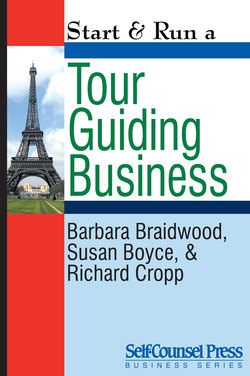Читать книгу Start & Run a Tour Guiding Business - Barbara Braidwood Susan Boyce & Richard Cropp - Страница 20
На сайте Литреса книга снята с продажи.
4. Your Résumé
ОглавлениеRésumé writing is a skill all on its own, and there are dozens of books on the subject. The following very basic list will help you catch the eye of a potential employer, but if you are at all uncomfortable about your résumé-writing skills, pay a professional. The investment will be worth it!
(a) Use plain, white paper — fancy colors, sparkles, or other gimmicks label you as an amateur in any field. Choose a type font and size that will be easy to read. Serif fonts tend to be easier on the eye than sans serif, for example, and any size less than ten point will make your reader squint. Twelve point is even better. If you do not have a laser printer, find someone who does and is willing to let you print out your résumé.
(b) Keep it short, to the point, and, above all, accurate. A résumé should be no longer than two pages except in the most unusual circumstances. A single, well-written page is best. Be sure it is grammatically correct and completely free of typos or spelling mistakes.
(c) Your name, address, phone number, and, if appropriate, fax number and e-mail address should appear centered at the top.
(d) State your objectives clearly. If you want to work locally only, say so. If you are willing to travel anywhere, any time, tell them that.
(e) Use active verbs such as developed, achieved, or organized when talking about previous experience.
(f) Special skills should be shown prominently and early in the résumé. Languages are especially big attention grabbers for a tour operator, but be sure to list all certificates and training such as first aid, CPR, and current licenses to drive motorcoaches or other vehicles.
(g) Volunteer work shows commitment to your goals and a willing attitude. If your neighborhood has a volunteer bureau it can save you many hours of door knocking and searching for some practical experience. While it is not as easy to find as other types of volunteer work, you can gain guiding experience this way. For example, many cruise line meet-and-greet guides are volunteers. Or you can contact local museums, botanical gardens, historical attractions, and art galleries. Many are chronically short of cash and welcome volunteers.
(h) Include hobbies if they are relevant and demonstrate experience. If you say you have been a member of Toastmasters for six years, a potential employer will know something important about your public speaking ability.
(i) This is a people industry. Whenever possible, drop your résumé off in person so at least one person knows what you look like and how you present yourself. Always be polite, professional, and immaculate in your appearance. Skilled receptionists and secretaries frequently eliminate sloppily dressed or rude applicants before the first round of job interviewing starts.
(j) Have some references available to show a potential employer during the interview. Be shameless about asking past employers or other responsible individuals for a letter of reference which will show you as levelheaded, energetic, reliable, and competent. If you organized a city tour for your church group or your son’s baseball team, the minister or coach will likely be more than happy to help you out.
No book can teach you how to have the personality tour operators are looking for when they hire guides. Once you are invited for an interview, be prepared before you go in, be natural during the process, and remember that “fit” within the company is just as important as skills and experience — sometimes even more important. Many guides, when talking about past interviews, have told us about “great” interviews which ended with the tour operator explaining, “You have a wonderful future in this business, but you’re not quite what we are looking for.” Do not get discouraged and always ask if your interviewer can recommend another company you should apply to.
